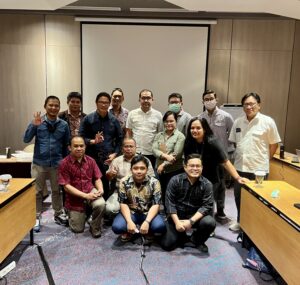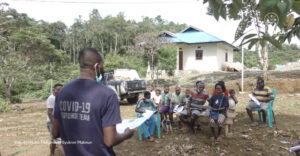
Corruption Eradication Commission (KPK) urged the follow-up of recommendation following the evaluation of palm oil licenses in West Papua before the Governor and Regent in West Papua on Thursday, 25 February 2021 at West Papua Governor office.
The result of palm oil license review in West Papua was delivered during the coordination meeting on “Result of Palm Oil License Review in West Papua Province” on a closed door meeting. The meeting was attended by governor, regent, regional secretary, head of regional apparatus organization (OPD), high ranking officials of West Papua and KPK.
West Papua Governor Dominggus Mandacan, KPK Deputy Alexander Marwata, and West Papua’s Food, Horticulture and Plantation Office Yacob S. Fonataba, attended the event as the resource persons.
In this case, the evaluation team of West Papua palm oil licenses addressed the recommendations to the regents as the license issuers and recommendations on palm oil licensing governance to the relevant Ministry/Institution.
“This will give more impact when the commitment is followed up by implementing the recommendations,” said Alexander Marwata to West Papua Governor, regional secretary and 8 regents of Sorong, South Sorong, Manokwari, South Manokwari, Teluk Wondama, Teluk Bintuni, Maybrat and Fakfak. West Papua government was in agreement with the commitment.
Palm oil license review in West Papua was conducted to 24 companies with licenses. The total of concessions of the 24 companies is 576,090.84 hectares. The license review here involved various stakeholders that have been carried out since July 2018 with reference to three policy instruments, namely Manokwari Declaration, Presidential Instruction No. 8/2018 on Suspension of Forest Clearance for Palm Oil Estate or Moratorium and KPK’s National Movement to Save Natural Resources (GNP-SDA).
As from the expanse, there are 383,431.05 hectares of forested areas to be saved as secured natural resources. The companies as license holder are located at Sorong, South Sorong, Manokwari, South Manokwari, Teluk Wondama, Teluk Bintuni, Maybrat and Fakfak.
“As from those companies, there are some concession areas whose licenses are legally subject to revocation,” said Alexander. Based on the evaluation, there are many companies that have yet to run their operations. It implies that the licenses acquired by those companies are not complete and planting any crop yet.
License revocation could be done because some companies have been allegedly considered breaching their obligation as mandated by the Plantation Business License. A number of companies have not cleared any land and planted crop yet, so there is opportunity to save forests cover in Tanah Papua.
Responding to the issue, Governor Dominggus said that the process was the efforts made by West Papua government to protect forests and improve governance in a bid to optimize the utilization of natural resources in sustainable way while siding with the customary communities.
“We hope the follow-up of the process could encourage the indigenous peoples significantly in natural resources management in West Papua,” said Dominggus.
KPK gave positive signs to the evaluation of palm oil licenses here while hoping that this could be expanded to a kind of license review to other land-based sectors. The use of spatial could optimize regional and state income without sacrificing environment through corrupt practices.
Similarly to KPK, Dominggus added, “The land that could be potentially saved from this license review will be promoted so that the indigenous community could manage in sustainable manners.”
The results of palm oil license review was also delivered to some civil society organizations (CSOs) whose major concerns focus on palm oil estate. The CSOs are expected to help monitor the process of action plan implementation in the future.
Editor: Leo Wahyudi







